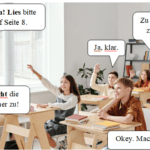In this lesson, you will learn about German separable and inseparable verbs, specifically focusing on their prefixes. You’ll discover what verbs with a separable prefix (Trennbare Verben) are, when the prefix is separated from the verb and when it is not, what position they have in the sentence, and what meaning they have. Additionally, you’ll learn about verbs with an inseparable prefix (Untrennbare Verben), their meanings, and their specific characteristics.
Thank you for reading this post, don't forget to subscribe!CONTENTS
What are separable verbs?
When are separable prefixes separated?
What are inseparable verbs?
Prefixes that can be separable and inseparable
Participle II with separable and non-separable prefixes
Click on:
Grammar Content
What are separable verbs?
The separable prefix is separated from the verb in the present tense, past tense, and imperative and goes to the end of the sentence. This creates a problem for us, because we don’t have such a thing in our language and because the prefix changes the meaning of the verb.
For example:
Present tense: Ich stehe. – I stand.
Present tense : Ich stehe auf. – I’m getting up.
Past tense: Ich stand auf. – I got up.
Imeperative: Steh auf! – Get up!
But for example in the perfect tense, future tense, or in sentences with modal verbs, that prefix remains with the main verb.
For example:
Ich bin aufgestanten.
Ich werde morgen früh aufstehen.
Ich muss früh aufstehen.
The most common separable prefixes:
ab-, an-, auf-, aus-, bei-, ein-, mit -, nach-, her-, hin-, vor-, weg-, zu-, zurü

Here are examples of verbs and sentences with a separable prefix:
- ab|fahren – Der Bus fährt um 8 Uhr ab.
- an|rufen – Ich rufe meine Eltern jeden Tag an.
- auf|räumen – Ich räume meine Wohnung auf.
- aus|gehen – Er geht jeden Samstag aus.
- bei|tragen – Ich trage zur Verbesserung der Lage bei.
- ein|kaufen – Eva kauft nach der Arbeit noch ein.
- los|fahren – Wir fahren gleich nach dem Frühstück los.
- mit|kommen – Kommst du mit ins Kino?
- vor|bereiten –Ich bereite mich gerade auf mein Examen vor.
- weg|gehen – Er ging aus dem Büro weg.
- zu|machen – Mach bitte die Tür zu!
Separable prefixes can stand alone as a word (eg. preposition, adverb) The accent is then on the prefix.
When are separable prefixes separated?
Prefixes are separated in the:
- present tense :Ich komme mit!
- past tense : Ich kam mit!
- imperative: Komm mit!
Prefixes are not separated:
▪ with the modal verb in the sentence: Ich möchte mitkommen.
▪ in the future tense: Ich werde mitkommen.
▪ with subjunctive II: Ich würde mitkommen.
▪ in dependent clauses: Er will, dass ich mitkomme.
▪ in participle II ge- stands after the prefix: mitgekommen
▪ with the infinitive with zu: mitzukommen
What are inseparable verbs?
Inseparable prefixes are not independent words. The accent is not placed on the prefix.
These 8 prefixes are always inseparable:
be- ge-
emp- miss-*
ent- ver-
er- zer-
In participle II there is no ge-:
hat bekommen
hat erzält
hat verstanden
▪ infinitive with zu:
zu bekommen
zu erzählen
zu verstehen
The prefix miss* is still an exception, although it belongs to the inseparable prefixes, but in the case of the following verbs, it is still SEPARATED from the verb, especially in the perfect participle. These participles are actually used mainly as adjectives in modern German.
For example:
missgebildet – deform
missgestimmt – ill-humored
missgelaunt – bad-tempered
missgestaltet – misshapen, disfigured
The prefix “miss” as an inseparable prefix, when combined with a verb indicates that something is wrong, not right, not good, or signifies the opposite of something.
For example:
missachten (missachtete, missachtet) – to disregard
missbrauchen (missbrauchte, missbraucht) – to abuse
misverstehen ( missverstand, misverstanden) – to misunderstand
Here are more examples of verbs and sentences with inseparable prefixes:
- besuchen – Ich besuche meine Oma jedes Wochenende.
- empfehlen – Kannst du mir ein gutes Restaurant empfehlen?
- entstehen – Hier entsteht ein neues Einkaufszentrum.
- erzählen – Er erzählt mir alles von seiner Reise.
- gefallen- Der Film gefällt mir überhaupt nicht.
- missverstehen – Du hast meine Frage völlig missverstanden.
- verstehen – Ich verstehe dich nicht.
- zerstören- Es zerstört dein Leben.
Click on:
Grammar Content
Prefixes that can be separable and inseparable
There is a certain group of prefixes that can be used as separable and as inseparable.
These are the following prefixes:
durch- , hinter-, über-, um-, unter-, voll-, wider-, wieder-
Examples:
| durch – Ich bin nur durchgereist. (I was just passing through./ I was just on the way through.) durch – Ich habe das ganze Land durchreist.( I have traveled all over the country.) |
| über – Er hat/ist mit der Fähre übergesetzt. (He has/has crossed over on the ferry.) über – Er hat einen Roman übersetzt. (He has translated a novel.). |
| um – Er hat alle Möbel umgestellt. (He has rearranged all the furniture.) um – Der Feind ist umstellt. (The enemy is surrounded.) |
| unter – Sie hat hier eine Stunde untergestanden. (She stood here for an hour.) unter – Sie hat sich unterstanden, ihren Chef zu kritisieren. (She dared to criticize the boss.) |
| wider – Das Wasser spiegelt die Wolken wider. (The water reflects the clouds.)wider – Er hat sich seinem Vater widersetzt.( He defied his father.) |
| wieder – Morgen hole ich mir meine Bücher wieder. (I’ll get my books back tomorrow.) wieder– Können Sie das bitte wiederholen? (Can you please repeat that?) |
Hinter is an inseparable prefix in modern German.
For example:
Sein Geschäftspartner hat ihn hintergangen. – His business partner betrayed him.
Wieder appears as an inseparable prefix only in the verb “wiederholen,” which means “to repeat.”
Voll stands as an inseparable prefix in the following examples:
Da hast du aber eine Meisterleistung vollbracht. -You’ve achieved a masterstroke there.
Ich habe meine Arbeit vollendet. – I have finished my work.
Verbs with separable prefixes maintain the original meaning of the verb, whereas verbs with inseparable prefixes take on a more figurative meaning. However, there are exceptions to this rule, particularly with the prefix “über-,” which is often inseparable even when it retains its basic meaning.
For example:
überwintern (to overwinter)
überfahren (to run over)
übersehen (to overlook)
überhören (not to hear sth)
überarbeiten (to rework)
übernachten (to stay overnight)
Die Lehrerin hat manche Fehler übersehen. – The teacher overlooked some mistakes.
Wir haben hier übernachtet. – Wir haben hier übernachtet.
The prefix über can express a difference in basic meaning:
Das Wasser ist übergeflutet. – Water is overflowing.
Der Fluss überflutete die Wiesen. – The river flooded the meadows.
She has taken it upon herself to criticize her boss. – She took the liberty of criticizing her boss.
Participle II of separable and inseparable verbs
Participle II with separable prefixes
ge – is placed between the prefix and the main verb:
- anrufen: an + ge + rufen = angerufen
- einkaufen: ein + ge + kaufen= eingekauft
- ausgehen: aus + ge + gehen = ausgegangen
Participle II with inseparable prefixes
Without ge- :
- besuchen = besucht
- entstehen = entstanden
- erleben = erlebt
See more:



